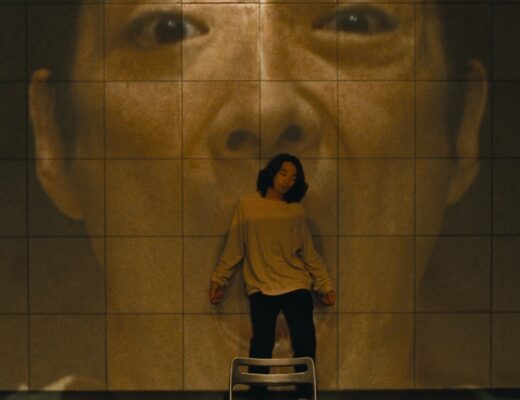There’s a difference between a breakfast of scrambled eggs (with sausage, tomatoes, and mixed peppers) and a proper omelet. The combination of the same ingredients — perhaps with a few extra spices thrown in the mix — makes all the difference between a sufficient (even good!) multi-dish breakfast and a rich, delectable omelet. The latter is more put together, more prepared — and that makes for, usually, a better breakfast experience. The same could be said of director Thomas Cailley’s The Animal Kingdom: it has all of the correct components of an exceptional film, though it puts them together in a way that leaves that potential unfulfilled.
Most notably, both the film’s premise and actress Adèle Exarchopoulos are underutilized. In the present, in the Gironde department of France, humans have inexplicably begun to mutate into animals. At first, they look like weird hybrids out of an X-Men comic book, before eventually losing almost the entirety of their human selves. François’ (Romain Duris) wife has mutated into some large mammal and is now considered state property as she receives experimental treatments to slow or reverse her mutations. Émile (Paul Kircher), the son of François and his now creaturely wife, shows the earliest signs of mutation, and simultaneously develops a friendship with a bird-hybrid in the nearby forbidden forest.
The human-to-animal mutation premise (and vice versa) — as old as storytelling itself — alludes to multiple analogies and impishly avoids committing to any. The obvious environmental destruction analogy almost can’t be avoided, though it requires more eisegesis than exegesis. In fact, beyond the mere accidents of the setup — a conflict between nature and humanity that puts both at risk — the only hard in-film evidence for this analogy is a split-second character design that instantly recalls the prosthetic of the original Planet of the Apes films. A more interesting read of The Animal Kingdom leans into the xenophobia and bigotry in Francophone Europe. The way the mutated humans are treated certainly seems to have a lot in common with the experiences of many immigrants and refugees in France, Belgium, and elsewhere. “Creatures” is the more acceptable language; the blatant bigots of the world call them “critters,” a purposefully more subordinating term. “No critters here!” can be found graffitied on walls, and, on one occasion, they are even spoken of in the same breath as “gypsies,” a derogatory term for the Romani, one of the most belittled ethnic groups in all of Europe. But even this interpretation can’t be taken without reservation because, well, they become animals.
Eventually, the “creatures” lose all ability to speak and become nearly indistinguishable from normal animals of the same species. Because most people in the real world, even those who value non-human animal life immensely, regard animals as somehow less than human (hence, why so many of us eat meat), and since The Animal Kingdom is no vegan power move in the manner of Okja, this interpretation is bound to meet its end. By teasing multiple analogies and committing to none, then, Cailley’s film fails to present anything of note, let alone profound, about what it means to be human. And from Eustace Scrubb in C.S. Lewis’ The Voyage of the Dawn Treader to Gregor Samsa in Franz Kafka’s The Metamorphosis, that is the very thing this sub-genre does best. Here, the transformation trope instead finds itself confined to mere entertainment fodder.
Viewers will also be disappointed if they watch The Animal Kingdom solely for Exarchopoulos, no doubt one of the great French-speaking talents still in their prime. She plays an ultimately useless police officer with minimal screen time. It’s easy to imagine another cut of the film where she develops an emotional or romantic connection with François. Perhaps that was even the original plan, but for some reason or another, that’s not the version viewers have here received. Still, the way Cailley deploys her here would be like only playing Nikola Jokic for eight short minutes in a game whose outcome was long decided before he ever stepped onto the basketball court. Her character ultimately leaves no lasting impression on the outcome of the plot, nor does she establish any real emotional resonance. It’s possible her role was originally larger and for some reason got excised for brevity; it’s also possible, to be less generous, that the cop she plays was thrown into the mix at the last minute just to secure her appearance. The latter would at least explain the general uselessness of the role as a different face to occasionally cut to.
The final cut of The Animal Kingdom, however, still appeals on a strictly aesthetic level. David Cailley’s camerawork impresses, especially during the pinnacle where the cinematography tracks Émile as he runs from authorities and stumbles onto a biodiverse utopia of creatures and animals. Cailley’s nighttime cinematography occasionally elevates the genre material to something horror-adjacent, while the daylight work maintains the verisimilar connection to life in modern France. All the while, the project on the whole is well-designed without ever being too polished in the ugly, glossy way that these sorts of films tend to go for. The creature design is also marvelous from start to finish; from a giraffe-sized stick bug and some Dementor look-alikes to the slow transformation of Fix (Tom Mercier) into a stirring and mildly unsettling bird of prey, the visual effects, make-up, and costume departments put forth exceptional work, lending the inhabitants of this universe distinctive designs without breaking the bank on uninspired Marvelized creature creation. Still, good-looking as the breakfast spread may be, it’s tough to shake the feeling that the omelet would have been better.
DIRECTOR: Thomas Cailley; CAST: Romain Duris, Adèle Exarchopoulos, Tom Mercier, Paul Kircher; DISTRIBUTOR: Magnet Releasing; IN THEATERS/STREAMING: March 15; RUNTIME: 2 hr. 10 min.
Originally published as part of Rendez-Vous with French Cinema 2024.







